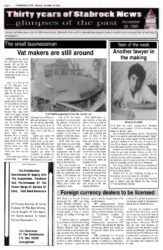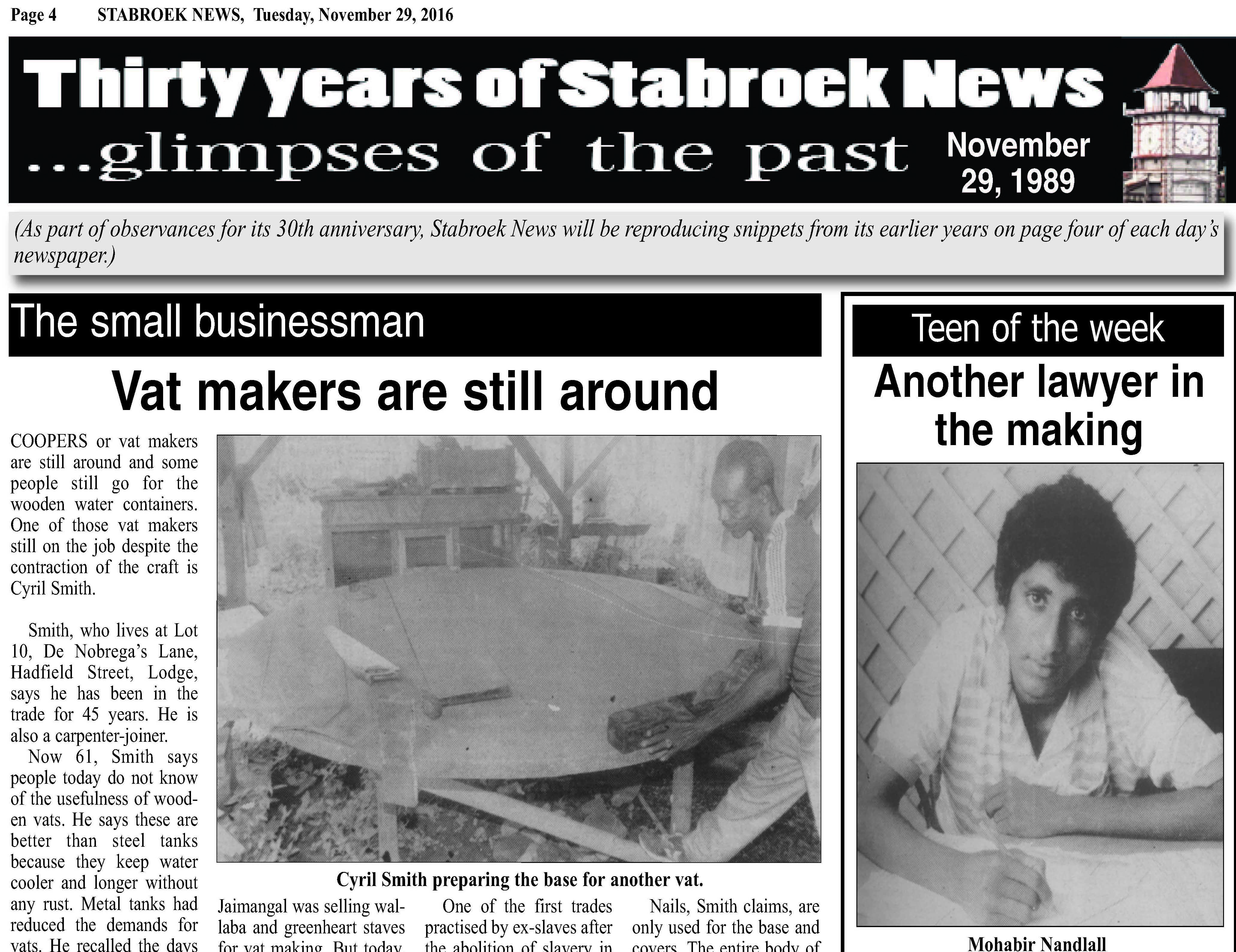COOPERS or vat makers are still around and some people still go for the wooden water containers. One of those vat makers still on the job despite the contraction of the craft is Cyril Smith.
Smith, who lives at Lot 10, De Nobrega’s Lane, Hadfield Street, Lodge, says he has been in the trade for 45 years. He is also a carpenter-joiner.
Now 61, Smith says people today do not know of the usefulness of wooden vats. He says these are better than steel tanks because they keep water cooler and longer without any rust. Metal tanks had reduced the demands for vats. He recalled the days when the wooden vessel was present in nearly every yard in Georgetown. In those days, he said, Bookers Rum Company used to sell old barrels made of oak wood to local purchasers who would convert them into vats. However, when it was taken over this exercise halted.
Smith says up to 1983 a businessman named Jaimangal was selling wallaba and greenheart staves for vat making. But today, one has to go as far as the Pomeroon area to purchase these staves and this is costly.
 Smith says staves for building vats are three inches wide by one and a half inches thick and varying lengths of between seven to ten feet. This material can either be greenheart or wallaba but he says people prefer wallaba because of its smell.
Smith says staves for building vats are three inches wide by one and a half inches thick and varying lengths of between seven to ten feet. This material can either be greenheart or wallaba but he says people prefer wallaba because of its smell.
One of the first trades practised by ex-slaves after the abolition of slavery in 1938, was the craft of vat-making. However, with the expansion of potable water systems the use of the vat started to diminish almost to the point of extinction.
Smith feels the cooperage trade can come back alive if materials are made readily available in Georgetown, and he said that the Government faced with a failing water supply system should take some steps in this direction.
Smith says a wooden vat of eight feet by six feet will cost some $18,000 to build and this would take three weeks if all materials are available. He says a vat properly made can last for fifteen years before any repainting is done.
Nails, Smith claims, are only used for the base and covers. The entire body of the vat is knitted with staves plastered by putty. He says the staves are cut evenly and a strainer and mesh are fitted on the cover to ensure no dirt enters with the rain water.
Smith explains that when constructing a vat, three people work together one of whom is the cooper.
He says that the best place for a vat in the yard, is an open spot where air circulates freely.
To preserve a vat when there is no rain water it should be filled with water to avoid the material from shrinking as when this happens the putty dries and crumbles and insects get easy access to the vats causing destruction.
Teen of the week
Another lawyer in the making
OUR teen this week, Aquarius-born, Mohabir Nandlall, wants to pattern his life on the theory that honesty is the best policy.
And he dreams of becoming a lawyer. “My greatest desire is to stand in court and defend people’s rights”
The teen has already begun working towards this ‘goal, by enrolling at the University of Guyana this year. He is doing a one-year course in political science then hopes to move on to studying law.
Mohabir is an old student of Queen’s College, from where he got eight business subjects at the CXC examinations. When he used to attend Q.C., the 16-ycar-old says he used to encounter severe transportation problems. But it is easier attending U.G., since he lives at Annandale, on the East Coast Demerara.
He is a keen cricket fan and was once a member of the Everest Cricket Club. Table tennis is also another of his favourite games.
Mohabir likes to read, “anything, so long as its interesting’’ and enjoys macaroni and cheese.
‘Crime of the Century’ is one of his favourite films and he admires stars like Danny De Vito, Tatum O’Neal and Brooke Shields.
Foreign currency dealers to be licensed
THE Dealers in Foreign Currency (Licensing) Bill 1989, was being rushed through Parliament up to press time yesterday despite objections by the opposition. The Bill will ‘license people wishing to conduct buying and selling of foreign currency.
A standing order was suspended by parliament to facilitate the reading of the bill. In proposing the bill, Finance Minister Carl Greenidge said it would be a way to harness foreign currency from the market that operates outside of the Central Bank. He also said that this bill was meant to create a viable exchange rate that would facilitate export-oriented growth and the incorporation of the parallel market.
PPP parliamentarian Reepu Daman Persaud said that government had constructed the bill without consulting interested parties like banks, the Georgetown Chamber of Commerce, the Consumers’ Association and the Guyana Manufacturers’ Association, TUC and FITUG. He said that the Bill had far-reaching effects and should not be pursued without these consultations.
WPA parliament Eusi Kwayana said that government was trying to legalise the trading on ‘Wall Street’ that they had previously defined as criminal. He said that the pioneers of this business might be discriminated against and not granted licence.
Licensees are expected to keep records of their transactions and will have to pay fees on a yearly basis as well as taxes. There are penalties for unlicensed persons conducting foreign currency transactions. The bill does not state what licensees are required to do with foreign currency accumulated through transactions but the minister can by notification in the Gazette direct a licensee to sell currency to persons approved by him. Mr. Greenidge said regulations will be made.

